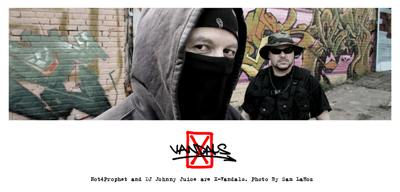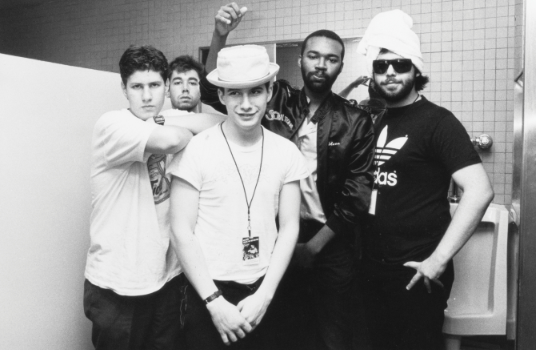Interview conducted and submitted by Young Lordette
Hip Hop, born from the Black-Nuyo-Rican Uptown ghettos of the seventies is the call to revolution that still beats in our blood. From the South Bronx to South Africa, Puerto Rico to Palestine to the Philippines, the African nations to the native lands and ghettos worldwide, Hip Hop bombs systems of oppression. Our words, beats, rhymes and graf become mind-molotov cocktails. Rebel artist street soldiers mobilize masses creating an international coalition of freedom fighters.

I recently spoke with the MC of the radical-rap-militant-music group from Uptown, NYC, X-Vandals about Hip Hop as an inter-national tool for revolution.
Lordette: Who are the X-Vandals?
N4P: The X-Vandals are DJ Johnny Juice, MC Not4Prophet, and anyone else who has ever had to use stealth, stealing and spit to survive America.
Lordette: And you are both from New York City?
N4P: Yes. I was born in Ponce, Puerto Rico, but raised in Harlem, NY, and Juice was born in the Bronx, NY to Puerto Rican parents.
Lordette: When did you and Juice first get into Hip Hop?
N4P: Well, Juice was a b-boy and graffiti writer from way back and, as he likes to say, witnessed the birth of Hip Hop right outside his front door. He also worked on Public Enemy’s first two classic records, “Yo Bum Rush the Show” and “It Takes a Nation of Millions to Hold us Back” when he was still a teenager. Me, I started out writing graf on walls when I was a little kid, which led to writing political slogans, which became poetry, which started me hollerin’ in the streets, which became spoken word that transformed into spitting which was all Hip Hop in the first and last place.
Lordette: I first met you through Ricanstruction, the collective of anarchist Boricua revolutionary artists that you work with. Would you like to talk a bit about that?
N4P: Well, Ricanstruction Netwerk is a community of (mostly) people of color that has been around for about ten years now. We started out on the streets of Harlem, but now we have cohorts and conspirators all over the place. We make militant music, write our reality on walls, make anti-fascist films, create puerto-political propaganda, build bridges and mind bombs en las esquinas de la calles; all within a DIY (do it yourself) anti-authoritarian cipher and with the intent of creating a radical and revolutionary mindset within our communities de color. In the beginning we had nothing, so we used what we didn’t have to make something. We’ve been doing it ever since.
Lordette: In one of X-Vandals songs, ya’ll mixed in one of my fave poets, Nikki Giovanni reading “A Poem for Black Boys.” In it, she encourages Black boys to revolution, saying, “You know the truth of what I’m saying/ Play Back-to-Black/ Grow a natural and practice vandalism/ These are useful games (some say a skill is even learned).” I feel it, when you flip it once more, as a poem for Black boys and girls in the song.
N4P: Yeah, that’s a poem that she wrote way back in the ’70s, so it’s amazing, and rather sad, how relevant it still is today. That’s why we used it. I had come across it in a book of Nikki Giovanni’s poetry and felt that the words were perfect for what we were trying to convey/say in the here/hear and now. But I think when you look at the current statistics for the number of Black “girls” that are going to prison and suffering so many of the other ills of our society/sh*tstem, you realize that it ain’t just boys no more….
Lordette: The revolutionaries from Nikki Giovanni’s generation were the Black Panthers, the Young Lords, Malcolm X, Assata Shakur and others, but Hip Hop comes from the generation born from the Panthers and the Lords. As a revolutionary culture that came out of the Black-Puerto Rican ghettos of New York city, Hip Hop has always been about bombing the we are fighting against, but what are some things that you feel we can do to build an even stronger fight?
N4P: I think first “Hip Hop” has to decide what it is and what it stands for, if anything. Hip Hop is well over 30 years old now and depending on who you ask, will depend on what answer you get as to what “Hip Hop” is. What made The Panthers or Lords different from Hip Hop is that they knew from jump what they stood for and were about and trying to seek/achieve politically when they formed, while Hip Hop just sort of came about organically thru a political condition but without necessarily having any kind of political notion or idea or ideology.
There’s a certain anarchic beauty to that, but at the same time it makes it difficult if you are trying to carve out any kind of political or anti-sh*tstem movement. For instance, if Hip Hop had had an anti-corporate stance from jump, big bizness would not have been able to co-opt it quite so easily. Once “Hip Hop” decides what it is about, then it/we will be able to decide what we gotta do, collectively. Until then, it s just a bunch of different people/individuals all over the Black planet who “feel” Hip Hop for all sorts of different reasons.
Lordette: If we had Hip Hop codes what would they be?
N4P: Hmm, “Hip Hop codes”…. Well, they actually DO exist, in a way. Written by Afrika Bambaataa and the Universal Zulu nation back in the day before today. Things like advocating for peace, love and having fun were pretty relevant to the so called Hip Hop nation that was just trying to live in peace and stay alive within a difficult sh*tuation, and doing their best to enjoy life, as rough as it may be. But I think a Hip Hop code that could save Hip Hop today would have to talk about refusing to sell out and knowing who your enemy really is, and protecting your own; (“your own” being, of course, anyone who is living according to the Hip Hop code). Things about living outside the sh*tstem and refusing to be part of it or accept anything from it. If you don’t want anything from Babylon then they can’t co-opt you. Things like the “stop snitching” campaign wouldn’t be a bad idea if it was about “no collaboration” with the enemy. Unfortunately, since we rob each other (within the Hip Hop nation) and deal the “man’s” drugs to each other, then there is no honor among thugs, and “stop snitching” has no worth or relevance within our struggle. If the sh*tstem wrote the thesis, then Hip Hop should write the anti-thesis…. on the walls.
Lordette: I think there is also a need to expand our definitions of who our revolutionaries were/are. Living, breathing, surviving day-to-day in our barrios is revolutionary in and of itself. Right now there is a trend in so-called conscious Hip Hop to defend what constitutes revolutionary according to a certain standard. The ghettos are bumping not necessarily “revolutionary” Hip Hop and reggaeton loudly. I’d love to walk down the streets of Washington Heights to the streets of East Harlem and be hit with your song, “Life is Warfare.”
N4P: Yeah, that’s why we wrote it; but that song is already out there, really. It’s in the beat from the streets themselves. But I should say, though, that the urge to dance is also a revolutionary urge, just as the urge to destroy is also a creative urge, so it doesn’t always have to be the words. I think that there is a kind of “revolutionary elitism” that says that some things are revolutionary and others are not. I think that all things that come from the down pressed communities worldwide are potentially revolutionary because they come out of communities under siege. So to suggest that some things are revolutionary because of the words that are used or because of what one is talking about specifically (or seems to be talking about) is bullsh*t. We will define our own revolution thru action and movement.
Lordette: Even with all the problems that exist, from the South Bronx to South Africa Hip Hop is still a weapon against that oppression. Where do you see the Hip Hop struggle located in South Africa and Puerto Rico in relation to its origins from the streets of Nueva York?
N4P: I think in South Africa and Puerto Rico, as well as places like Palestine and Cuba, they are taking from the essence of what Hip Hop represents for the sufferahs, rather than from the co-opted corporatized version of Hip Hop, or rap music more specifically, that is force fed to the world today via the TV and commercial radio. So, in some ways, the Hip Hop that is coming from other places on the planet are a throwback to what Hip Hop was always really about, coming out the hood. So, in many ways, it’s very pure…
Lordette: Hip Hop was born in the Bronx of the black ghetto youth. As Hip Hop is internationalized, we build a stronger coalition of armies world wide, from the ghettos and inner-colonies in the U.S. and Puerto Rico, alongside struggles in the Philippines, Palestine, South Africa and elsewhere. How are the X-Vandals international?
N4P: We come out of that struggle; we are that struggle. Whether it be the Black struggle in Zimbabwe or in Bed Stuy and the boogie down, we be the real deal. We’re the descendents of slaves still living, and surviving the colonial condition. We are the dissidents and dissonance of the streets and the struggle. The remembrance and remnants of what Bob Marley called Black survival…. Those who survived the middle passage…. shell shocked but still rockin’…. So, from Africa to America, we be the reality of rebellion… In any/every language….
Lordette: I’m bumping the cut Todos Somos Machetero from the X-Vandals new album. Our native sister Hailstorm and Palestinian sister Shadia are featured on that track talking about being
Macheteras. I love that song because it speaks directly to our common struggles, todos somos macheter@s.
N4P: In Puerto Rico there is an armed clandestine organization that is seeking Puerto Rican liberation, called Los Macheteros (Puerto Rican Peoples Army). Their founder was actually assassinated by the FBI two years ago. In Puerto Rico there is a saying among independentistas (those who advocate Puerto Rican independence) that is “todo Boricua machetero,” or all things/people who are Puerto Rican are macheteros. We wanted to extend the meaning of being machetero, to be anyone who struggles for freedom and an end to injustice/colonialism/imperialism/downpression regardless of where they are from. So with that song we wanted to put some MCs on there that were not Puerto Rican, but are very much part of the macheter@ struggle to get free. If one is smart, they will see that it’s all about solidarity in struggle…. Women, men, girls, boys, a rebel rainbow to batter down babylon, for real….
Lordette: When is your next record coming out?
N4P: It’s our next AND first record actually, and it is scheduled to come out on Oct 30th, which is a historical date within the Puerto Rican liberation struggle (look it up)….
Lordette: Which brings up another thing I appreciated about the record, the combination of anti-authoritarian, even anarchist, ideas with the anti-colonial, nationalist, struggle in Puerto Rico.
N4P: Well, we are not, per se, nationalist, any more then we are anarchist, or any other isms. But we do believe in, support, and struggle for the right of ALL people to be free…. so that includes Puerto Rico, which is the oldest colony on the planet. The liberation struggle in Puerto Rico has been going on for over 500 years now, so anyone who says that they are freedom fighters or activists for justice or anti-imperialists or in any way revolutionary, but does not support the liberation struggle in Puerto Rico is full of sh*t….
Lordette: Anything else you’d like to say?
N4P: Free Puerto Rico! Free Palestine! Free Mumia! Free all political prisoners and prisoners of war! Free the land! Free your minds!…. and ya ass will follow!!!!
For more info on X-Vandals:



Young Lordette asks some great in-depth questions of the X-vandals. Nice to see a journalist reaching for more.
With X-Vandals there’s finally something truly revolutionary to believe in, there’s finally something truly revolutionary to listen to that isn’t over peoples heads, banging peoples heads or preaching @ heads, there’s finally something truly revolutionary worth defending in hip-hop. No more making excuses that don’t hold water as to why hip-hop is vital, relevant or revolutionary. No more bling or b*thches or benz’s just burnin’ down bablyon. Finally anti-sh*tstem hip-hop with a DO 4 SELF aesthetic. X-Vandals could be the saviors of hip-hop!!! i know it sounds too good to be true but let’s wait and see… let’s wait and see…
Damn… X-Vandals! Finally someone is steppin’ up and bringing Hip Hop back from the slavery and chains we’ve allowed the corporate pimps to put us in. Good interview and thanks for bringing us the news on this project.
Stay up!
“So to suggest that some things are revolutionary because of the words that are used or because of what one is talking about specifically (or seems to be talking about) is bullsh*t. We will define our own revolution thru action and movement.”
I could never have put it better.
I am tired of being told what actions are “Revolutionary” just as much as I am tired of being told what id “Real Hip-Hop”… It seems so divisive to let others define the words for you…
Just a thought.
Great Interview.
I can’t wait to hear more of the record.
Excellent interview. I’m tired of reading the usual stuff where the interview is nothing more them a commercial to promote a “product”.
I’m definitely checking for X-vandals. Finally some intelligent ideas and revolutonary rhymes too in this Hip Hop thang.
’bout time!
that’s right plant those seeds by making revolution real through music and action. That’s why I trully respect musicians, artists who send a message of resistance and move forward with practice. Boricua realness, I’m with you.
pilar